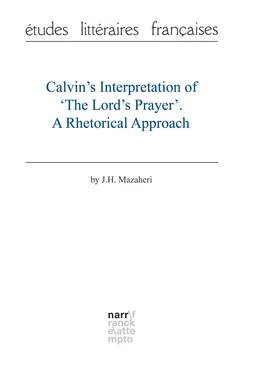Professor J.H. Mazaheri - Calvin's Interpretation of 'The Lord's Prayer'. A Rhetorical Approach
Здесь есть возможность читать онлайн «Professor J.H. Mazaheri - Calvin's Interpretation of 'The Lord's Prayer'. A Rhetorical Approach» — ознакомительный отрывок электронной книги совершенно бесплатно, а после прочтения отрывка купить полную версию. В некоторых случаях можно слушать аудио, скачать через торрент в формате fb2 и присутствует краткое содержание. Жанр: unrecognised, на английском языке. Описание произведения, (предисловие) а так же отзывы посетителей доступны на портале библиотеки ЛибКат.
- Название:Calvin's Interpretation of 'The Lord's Prayer'. A Rhetorical Approach
- Автор:
- Жанр:
- Год:неизвестен
- ISBN:нет данных
- Рейтинг книги:4 / 5. Голосов: 1
-
Избранное:Добавить в избранное
- Отзывы:
-
Ваша оценка:
- 80
- 1
- 2
- 3
- 4
- 5
Calvin's Interpretation of 'The Lord's Prayer'. A Rhetorical Approach: краткое содержание, описание и аннотация
Предлагаем к чтению аннотацию, описание, краткое содержание или предисловие (зависит от того, что написал сам автор книги «Calvin's Interpretation of 'The Lord's Prayer'. A Rhetorical Approach»). Если вы не нашли необходимую информацию о книге — напишите в комментариях, мы постараемся отыскать её.
Calvin's Interpretation of 'The Lord's Prayer'. A Rhetorical Approach — читать онлайн ознакомительный отрывок
Ниже представлен текст книги, разбитый по страницам. Система сохранения места последней прочитанной страницы, позволяет с удобством читать онлайн бесплатно книгу «Calvin's Interpretation of 'The Lord's Prayer'. A Rhetorical Approach», без необходимости каждый раз заново искать на чём Вы остановились. Поставьте закладку, и сможете в любой момент перейти на страницу, на которой закончили чтение.
Интервал:
Закладка:
Moreover, continues Jesus, the Father already knows what we want to say when we pray, so we should not be like those superstitious people: “Do not be like them [the Gentiles], for your Father knows what you need before you ask him” ( Mat 6: 8). Here is Calvin’s comment of this verse:
Ce seul remede suffit à purger et abolir la superstition qui est ici condamnee. Car d’ou vient cette folie que les hommes pensent beaucoup gagner quand ils importunent Dieu par leur babil, sinon pource qu’ils imaginent qu’il est semblable à un homme mortel, qui a besoin d’estre adverti et solicité? Mais quiconques est bien persuadé que Dieu non seulement a soin de nous, mais aussi cognoist nos necessitez, et previent nos souhaits et solicitudes avant que nous le requerions, cestuy-la sans beaucoup babiller se contentera de prolonger ses prieres tant qu’il sera besoin pour exercer sa foy; mais d’user de grande Rhetorique envers Dieu pour le flechir par paroles, il estimera cela mal-seant et ridicule. Sur ceci on pourroit dire que si Dieu, avant que nous le requerions, cognoist ce qui nous fait besoin, que c’est une chose superflue de prier. Car s’il est de soy-mesme enclin à nous aider, quel besoin est-il que nos prieres entrevienent pour empescher le cours volontaire de sa providence? La solution est facile, quand nous considerons quelle est la fin et le but de la priere. Car les fideles ne prient pas pour advertir Dieu de quelque chose qui luy soit incognue, pour l’inciter à faire son office, ou le soliciter, comme s’il tardoit trop, mais plustost afin de se resveiller eux-mesmes à le cercher, d’exercer leur foy en meditant ses promesses, de se soulager en deschargeant leurs solicitudes sur luy, et finalement pour rendre tesmoignage tant à eux-mesmes comme aux autres, qu’ils esperent et attendent tous biens de luy seul. Et aussi, luy de son costé, ce que liberalement et n’estant point encores requis, il a deliberé de nous donner. Toutesfois il promet qu’il l’ottroyera à nos prieres. Parquoy il nous faut entendre l’un et l’autre, assavoir qu’il previent volontairement nos requestes, et que toutesfois par prieres nous obtenons de luy ce que nous demandons. Touchant ce qu’il diffère quelque fois longuement à nous aider, et mesme quelque fois ne complaist pas à nos desirs, nous en traiterons en un autre lieu plus propre. ( Commentaires 123)3
This text contains several interesting ideas:
1º) The idea of “Superstition”. This term was relatively new in French, since the first use of it goes back to the late 14th century. It is thus mentioned, for the first time in all likelihood, in Raoul de Presles’ translation of Augustine’s De Civitate Dei ( La Cité de Dieu ) in 1375.4 In classical Latin, superstitio refers to the “attitude of irrational religious awe or credulity, particular superstitious belief or practice, foreign or non-orthodox religious practice or doctrine,” to which the Oxford English Dictionary adds that it is “in post-classical Latin also luxury, profusion (8th cent.), superfluity (9th cent.)…” ( OED ). Maybe, by the excess of words and repetitive prayers, some people think that they will be better heard by God. At any rate, it is thanks to the first translation in French of Augustine’s City of God , in 1375, that the term “superstition” was introduced first in French, then from the latter (Middle French) into English. But here is the passage where the word appears in Augustine’s work:Cicero the augur laughs at auguries, and reproves men for regulating the purposes of life by the cries of crows and jackdaws. But it will be said that an academic philosopher, who argues that all things are uncertain, is unworthy to have any authority in these matters. In the second book of his De Natura Deorum , he introduces Lucilius Balbus, who after showing that superstitions have their origin in physical and philosophical truths, expresses his indignation at the setting up of images and fabulous notions, speaking thus: ‘Do you not therefore see that from true and useful physical discoveries the reason may be drawn away to fabulous and imaginary gods? This gives birth to false opinions and turbulent errors, and superstitions well-nigh old wifeish.5Here, Calvin highlights the fact that verbosity (“babil”) is folly (“folie”), and is condemned (“condamnee”) by the Lord as superstition. One should not importune Him. What is superstitious, explains the exegete, is that people who pray long, futile, and repetitious prayers, imagine God to be like a human being (“pource qu’ils imaginent qu’il [God] est semblable à un homme mortel)—critique of anthropomorphism, though this term is anachronic.
2º) But a long prayer is not necessarily a bad sign, Calvin thinks. Indeed, someone who earnestly has more to say to God, “se contentera de prolonger ses prieres tant qu’il sera besoin pour exercer sa foy.” It is then a matter of personal spiritual need —a prayer can be longer if one feels that in this way one’s faith gets more “exercised” or strengthened, and not because God may be more persuaded, which is just an unsuitable and ridiculous idea (“mal-seant et ridicule”).
3º) Now, if someone objects that praying may not even be necessary, since God already knows what we want, he or she ought to consider the object and purpose of prayer (“quand nous considerons quelle est la fin et le but de la priere”). We are here reminded that if we pray, it is not because we want to tell God something He is not aware of, in order to incite Him “to do his duty” (“l’inciter à faire son office”) or “to listen to our request” (“le soliciter”). It is because we need to wake up and seek Him (“mais plustost afin de se resveiller eux-mesmes à le cercher”). Prayer is also a spiritual exercise: the believers pray to “exercer leur foy”, i.e. , to put into practice their faith and strengthen it, as they meditate on God’s promises (“meditant ses promesses”). Furthermore, they relieve themselves from their solicitudes—word to be taken in the etymological sense (< Lat. Sollicitudo )—of worries, troubles, or anxieties (“se soulager en deschargeant leurs solicitudes sur luy”). Finally, if they pray, it is because they wish to demonstrate that their only hope resides in God, for they know that every good comes from Him.6 Finally, a prayer testifies to this belief (“finalement pour rendre tesmoignage tant à eux-mesmes comme aux autres, qu’ils esperent et attendent tous biens de luy seul”), and God, who even gives us more than what we request (“ce que liberalement et n’estant point encore requis, il a deliberé de nous donner”) will grant it with our prayer.
4º) Sometimes, however, we may wait a long time before we receive what we have asked from Him (“il diffère quelque fois longuement à nous aider”), and even sometimes we do not receive it at all (“et mesmes quelque fois ne complaist pas à nos desirs”). The Reformer promises to discuss this issue in another and more appropriate place (“nous en traiterons en un autre lieu plus propre”).
V. The “Pater noster” as a Model
Calvin points out the fact that Jesus offers us a model of prayer for several reasons. What matters to the Lord is the content or what a good prayer addressed to the Father should consist of. Here is the way the theologian sets it forth in The Institutes :
Maintenant davantage, il nous faut apprendre non seulement la façon de faire oraison, mais le stile mesme et formulaire que nostre Père céleste nous en a donné par son trescher Fils, nostre Seigneur Iesus Christ (Matth. 6, 9; Luc 11, 2). En quoy nous pouvons cognoistre une bonté et douceur incompréhensible. Car outre ce qu’il nous admoneste et exhorte de nous retourner à luy en toutes noz nécessitez, comme enfans ont leurs recours à leur père toutes fois et quantes que le besoin les presse, cognoissant que nous ne pouvons assez entendre combien grande est nostre povreté et misère, ne comprendre ce qui est bon à luy demander, et ce qui est utile et profitable, il a voulu subvenir à nostre ignorance, et suppléer de soy-mesme le défaut de nostre esprit. ( Institution III, xx, 34, 376–77)1
Читать дальшеИнтервал:
Закладка:
Похожие книги на «Calvin's Interpretation of 'The Lord's Prayer'. A Rhetorical Approach»
Представляем Вашему вниманию похожие книги на «Calvin's Interpretation of 'The Lord's Prayer'. A Rhetorical Approach» списком для выбора. Мы отобрали схожую по названию и смыслу литературу в надежде предоставить читателям больше вариантов отыскать новые, интересные, ещё непрочитанные произведения.
Обсуждение, отзывы о книге «Calvin's Interpretation of 'The Lord's Prayer'. A Rhetorical Approach» и просто собственные мнения читателей. Оставьте ваши комментарии, напишите, что Вы думаете о произведении, его смысле или главных героях. Укажите что конкретно понравилось, а что нет, и почему Вы так считаете.












